Product
Firmness
Score
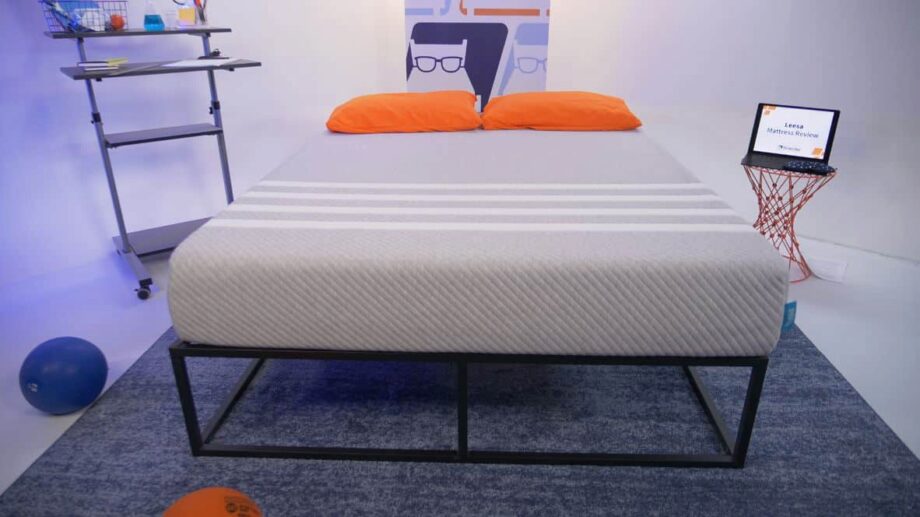
Product
Firmness
Score
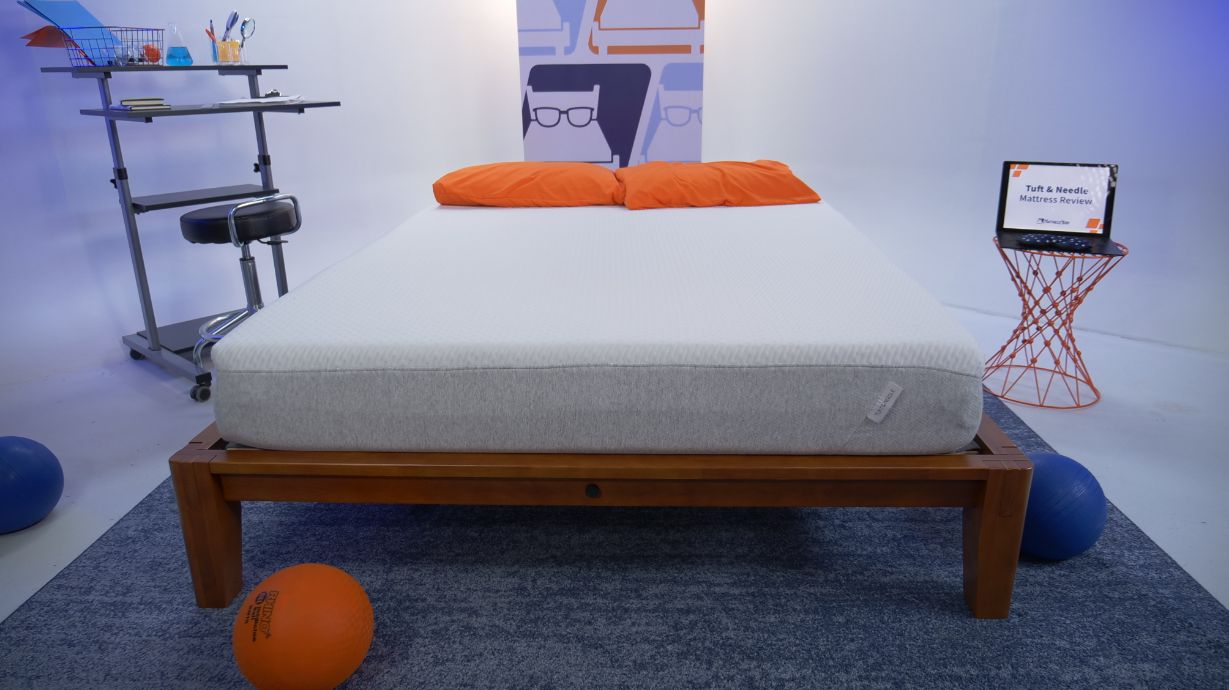
Disclosure: By clicking on the product links in this article, Mattress Nerd may receive a commission fee at no cost to you, the reader. Read full disclosure statement.
Our Leesa vs. Tuft & Needle mattress comparison explores the similarities and differences between these popular bed-in-a-box mattresses. Once you know how these beds stand apart, you can make an informed decision about which one is best for your needs.


The Tuft & Needle Original is a budget-friendly all-foam bed with a balanced feel. The Leesa is better for side sleepers and people who like to be hugged by their beds. The Tuft & Needle is more affordable and a touch firmer, with its extra support better suited for most stomach sleepers.
| Tuft and Needle is best for… | Leesa is best for… |
| Budget shoppers | People who like a contouring feel |
| Back and stomach sleepers | Older adults with joint pain |
| Couples | Couples and those who co-sleep |
Video reviews are a great way to showcase The Leesa vs The T&N comparison. Here’s an in depth analysis of which mattress is perfect for you!
The Tuft & Needle Original mattress is a 7/10 on the firmness scale, making it best for stomach and back sleepers. The Leesa Original is a 6/10 and better suited for side or back sleepers.
The Leesa Original is a memory foam mattress that gently cradles the body’s curves. The Tuft & Needle Original is a budget-friendly all-foam bed with a balanced feel. The Leesa is better for side sleepers and people who like to be hugged by their beds. The Tuft & Needle is more affordable and a touch firmer, with its extra support better suited for most stomach sleepers.
The Leesa Original is a memory foam mattress that gently cradles the body’s curves. The Tuft & Needle Original is a budget-friendly all-foam bed with a balanced feel.
The Leesa is better for side sleepers and people who like to be hugged by their beds. The Tuft & Needle is more affordable and a touch firmer, with its extra support better suited for most stomach sleepers. Both mattresses absorb motion, helping couples sleep together without frequent interruptions.
Tuft and Needle Performance By Body Type & Sleeping Position:
| Body Type: | BACK SLEEPERS | STOMACH SLEEPERS | SIDE SLEEPERS |
| Lightweight (< 130 lbs): | 4 | 4 | 2 |
| Average-weight (130–230 lbs): | 4 | 3 | 4 |
| Heavyweight (> 230 lbs): | 3 | 2 | 2 |
Leesa Performance By Body Type & Sleeping Position:
| Body Type: | BACK SLEEPERS | STOMACH SLEEPERS | SIDE SLEEPERS |
| Lightweight (< 130 lbs): | 5 | 4 | 4 |
| Average-weight (130–230 lbs): | 5 | 3 | 3 |
| Heavyweight (> 230 lbs): | 2 | 1 | 2 |
The Leesa excels at supporting and maintaining spine alignment for average-weight back sleepers, the same with stomach and side sleepers, providing enough support to keep the spine aligned while contouring comfortably to your curves. Combination sleepers will enjoy the memory foam layers’ work to prevent motion transfer.
The T&N is perfect for average-weight back and side sleepers as they experience light cradling of the spine without excessive dipping at the hips. It’s not the most responsive mattress we’ve ever tested, but it will suffice for the average combination sleeper. However, it might just be too soft for stomach sleepers as they need firmer support.
The Leesa might work for some heavyweight back sleepers because they need a firmer mattress for support, similar to side, combination, and stomach sleepers who will find the all-foam construction too soft which leads to sinking too deeply.
For heavyweight sleepers, The T&N might just be too soft for you. Back, side, stomach, and combination sleepers will get much better support on a firmer mattress with sturdier materials like innerspring coils.
The Leesa provides proper support for your spine and neck for lightweight back sleepers. For stomach and side sleepers, it provides enough support to keep the spine aligned while contouring comfortably to your curves. The memory foam layers work to prevent motion transfer perfect for combination sleepers.
The T&N is a good mattress for lightweight back sleepers and stomach sleepers experiencing light cradling of the spine, combination sleepers who alternate between their back and stomach will also find this excellent for tossing and turning with ease. However, this may not be suitable for side sleepers for it can be a little too firm.
The Leesa is an all-foam mattress that excels in support, cooling, and pressure relief. It’s made with three layers of foam. The Tuft & Needle is a foam blend mattress that’s similar in construction to the flagship mattresses from competitors like Casper and Leesa.
| T&N Mattress Materials | Leesa Mattress Materials |
| White Soft-Knit Fabric Cover | Grey Twill Cover |
| Tuft & Needle Adaptive Foam (3”) | Soft Polyfoam (2”) |
| High-Density Foam Base Layer (7”) | Memory Foam (2”) |
| High-Density Support Foam (6”) |
The Leesa twill cover is seamless, making a smooth surface for you to sleep on while The T&N white soft-knit fabric is breathable yet cozy, supporting a temperature-neutral sleeping experience.
Leesa calls their “LSA200 foam” designed to mimic the responsive feel of latex to keep sleepers cool and respond quickly to their movements. T&N Adaptive foam is an open-cell foam, meaning there are plenty of air pockets to facilitate airflow, cooling ceramic gel beads, and graphite.
Leesa’s polyfoam layer makes up the core support of the mattress dense enough to withstand years of everyday use. The T&N foam base creates a firmer feel the further you sink into the mattress reducing motion transfer.
| Size | Tuft and Needle Prices | Leesa Prices |
| Twin | $645.00 | $849.00 |
| Twin XL | $695.00 | $899.00 |
| Full | $795.00 | $1099.00 |
| Queen | $895.00 | $1299.00 |
| King | $1295.00 | $1599.00 |
| California King | $1295.00 | $1599.00 |
For exclusive discounts on both beds see our Tuft and Needle mattress coupons and Leesa mattress coupons.
Best for: budget shoppers, back and stomach sleepers, and couples.
Nerd Score
3.5/5
Best for: people who like a contouring feel, older adults with joint pain, couples, and those who co-sleep.
Nerd Score
3.2/5
A mattress that traps heat can quickly ruin a good night’s sleep, especially for people who run hot or sleep in warm climates without A/C. The Tuft & Needle sleeps cooler than the Leesa mattress. The Leesa’s memory foam layer absorbs more heat than the Tuft & Needle, which is made entirely from breathable polyfoam. The Tuft & Needle also has cooling graphite and gel to support healthy temperature regulation.
Motion isolation refers to a mattress’s ability to reduce the transfer of motion across the bed when you shift positions or get in or out of bed. While motion transfer doesn’t matter much for solo sleepers, couples who share a bed should consider motion isolation when they purchase a new mattress—better motion-damping properties mean more sound sleep.
A mattress with a high level of edge support will minimize sagging around the edges, allowing you to spread out and take advantage of the entire mattress width. For people who share the bed, a few extra inches can be a big win for comfortable sleep. Additionally, sturdy edges provide a better surface for sitting and are helpful for supporting getting in and out of bed.
Both mattresses provide a decent amount of edge support, but the Tuft & Needle’s extra firmness gives it a slight edge. Because the Leesa is a bit softer, it’s more likely to sink around the edges, especially when you sit on them.
The wrong mattress can cause you to wake up with aches and pains. When shopping for a new mattress, you should carefully assess the materials used in the bed as well as the firmness level.
Softer mattresses offer pressure relief for side sleepers who need cradling around sensitive pressure points. Stomach and back sleepers don’t need the same level of cushion, but most prefer a touch of pressure relief to contour their lower back and hips.
If you’re a side sleeper in need of pressure relief, we recommend the Leesa Original mattress. Both the Tuft & Needle and Leesa provide an excellent balanced feel for back sleepers, while stomach sleepers need the added support the Tuft & Needle brings.
However, if you need a mattress for all sleeping positions, you may be a combination sleeper that requires the right balance of pressure relief and responsive upper layers to contour around the body.
Similar to the pressure relief points above, we advise side sleepers to go with the Leesa Original for its softer contouring. Back sleepers are likely to experience great alignment on either mattress, and stomach sleepers typically prefer the firmer Tuft & Needle mattress. The added firmness keeps the hips from sinking in too far.
You want your mattress to last a long time without losing its shape or firmness. The Leesa and Tuft & Needle each offer average durability, likely to last around seven years before softening disrupts comfort. Neither bed boasts ultra-durable materials like latex foam or innerspring coils, so they are not the most durable beds available.
The T&N offers free shipping within the US via FedEx for 3-7 business days. Offering a 100-night sleep trial period and free returns within those days.
The T&N mattress has an industry-standard 10-year warranty that covers defects and body indentations deeper than ¾”.
Leesa offers free shipping within the US for 3-10 business days. Offering a 100-night sleep trial period and a 30-day break-in period before initiating a return.
Leesa mattress has an industry-standard 10-year warranty that covers defects and body indentations deeper than 1”.
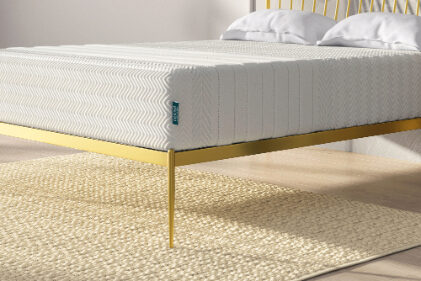

Financing options are available for this mattress.
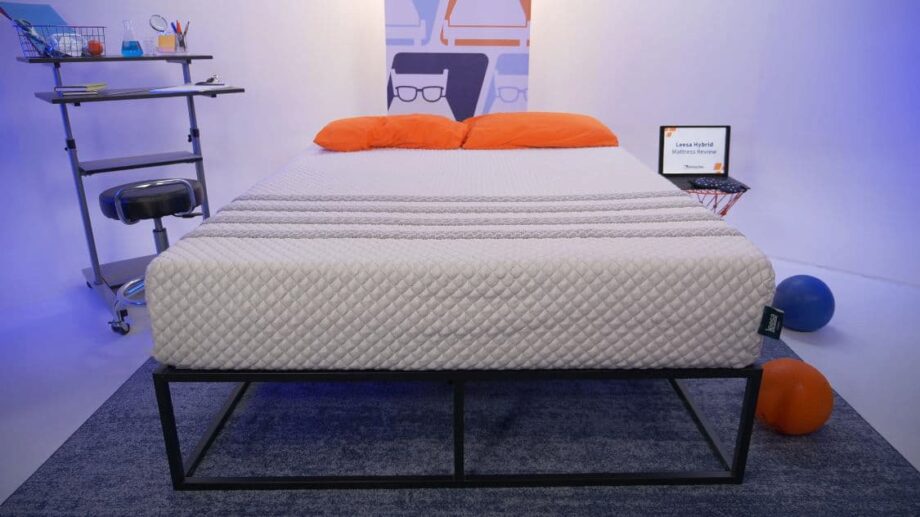

Financing options are available for this mattress.
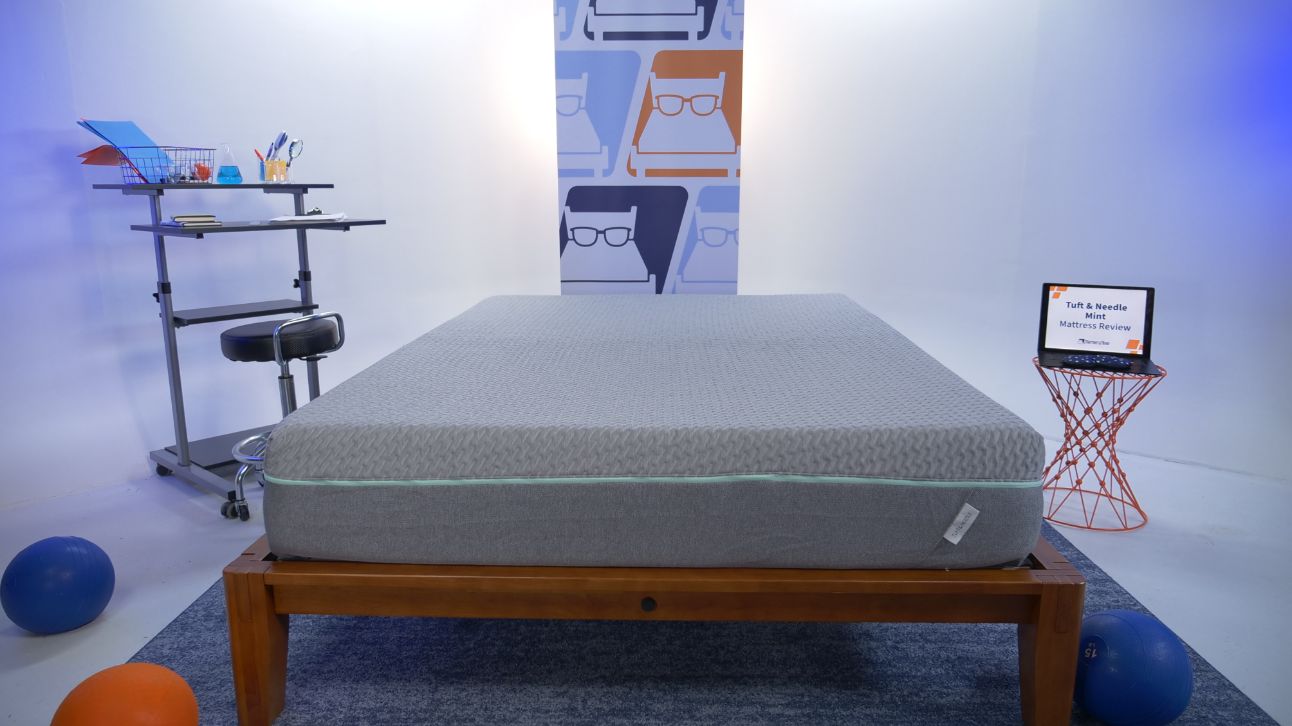

Financing options are available for this mattress.
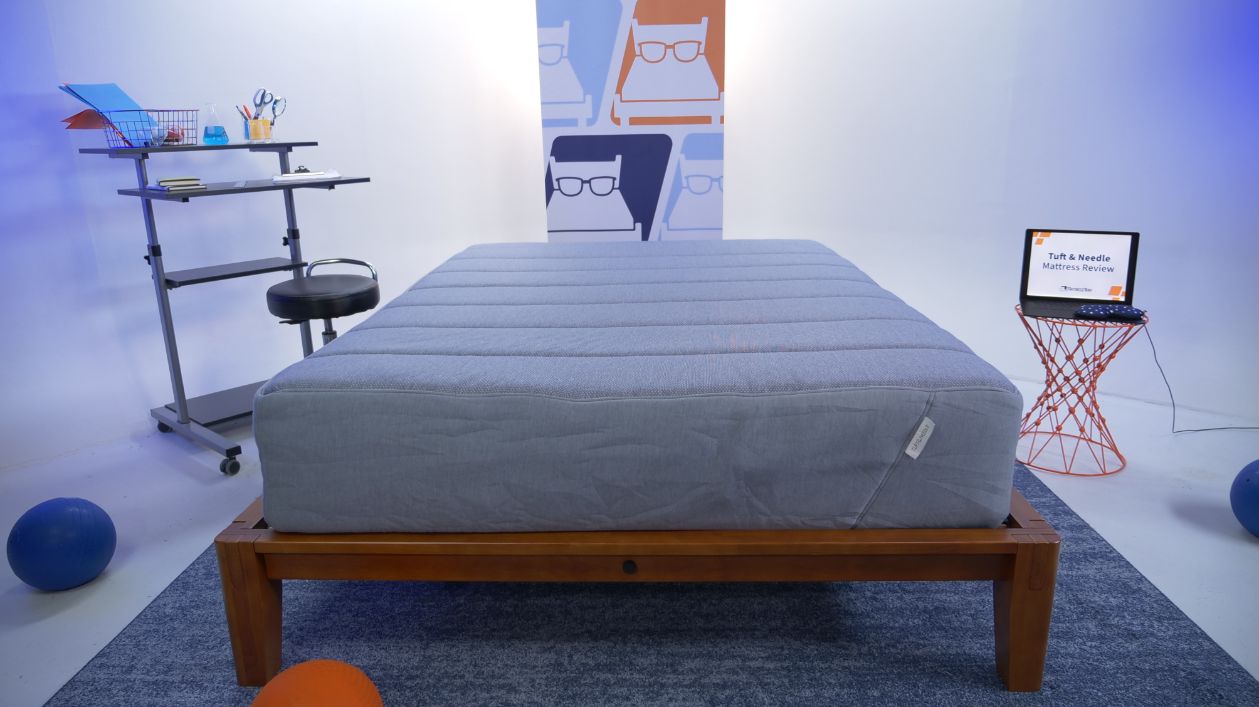

Financing options are available for this mattress.
The Leesa mattress is better suited for side sleepers and people who like the pressure-relieving cradle of memory foam. The Tuft & Needle is better for firm mattress fans, stomach sleepers, and budget shoppers. Both beds come with a risk-free 100-night sleep trial, free delivery, and a 10-year warranty.
We expect your Leesa mattress to last around seven years before showing signs of wear and tear. To get as many years of use as possible, it’s important to care for your mattress—keeping it clean and setting it up on a supportive base or bed frame.
Tuft & Needle manufactures all of their mattresses in the USA. They use both domestic and imported materials to craft their mattresses, which are made up largely of proprietary foams, coils, knit fabrics, and inclusions like gel, ceramic, and graphite. Also, they’re partnered with mattress manufacturing giant Serta Simmons.
We do not recommend putting them on a box spring. Box springs are designed to support spring mattresses and, therefore, can change the way foam mattresses feel. The Leesa mattress is designed to offer maximum comfort when placed on a hard, stable surface (like a foundation or platform bed).